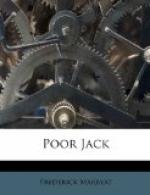married, Peter Strong, all of Rotherhithe, and to
Thomas Day, Henry Day, and Nicholas Day, of Eltham,
the whole of my money and personal effects,
share
and share alike, equally divided among them all.
There, sir, that will do. I can’t write,
but I’ll put my cross to it.’ Well,
the old fellow died that night, and notice of his
will was sent to his nephews and nieces, who all came
on the day of his burial dressed in their best, for
they were all mechanics and laborers, poor people,
to whom, I suppose, a legacy was a great object.
The chaplain had asked Nobbs where his money was,
and he replied that it was in the hands of Lieutenant
——, who knew all about his affairs.
After the funeral they all went in a body to the lieutenant,
who stated that he had ten shillings belonging to Nobbs,
out of which seven shillings were to be deducted for
the white pall; and that as for his other effects,
they must be in his cabin, as he never heard of his
having anything but what was there. So we went
to his cabin, and there we found five or six penny
prints against the wall, two pair of old canvas trousers,
and an old hat, six cups and saucers, cracked and
mended; and this was all his property, altogether not
worth (with the three shillings) more than seven or
eight at the outside, if so much. You may guess
the disappointment of his nephews and nieces, who
had lost a good day’s work and come so far for
nothing; and I must say they were not very dutiful
in their remarks upon their old uncle as they walked
off. Now you see, Tom, this old fellow had been
in the hospital for more than twenty years, and had
been able to save no more than what he had out of
his shilling per week, and in his eyes this small
property was very large, for it was the saving of twenty
years. He thought so, poor fellow, because he
probably had never saved so many shillings in his
life. There was no joking about it, I can assure
you.”
“Well, father, I hope I may be able to save
more than seven shillings before I die; but no one
knows. I have made my decision as I think for
the best, and we must leave the rest to Providence.
We never know whether we do right or wrong.”
“Never, Jack; things which promise well turn
out bad, and things which look very bad often turn
out just as well. I recollect an instance which
was told me, which I’ll give you as a proof that
we never know what is best for us in this world.
A man may plan, and scheme, and think in his blindness
that he has arranged everything so nicely that nothing
can fail, and down he lies on his bed and goes to
sleep quite satisfied that affairs must turn out well
as he has ordered them, forgetting that Providence
disposes as it thinks fit. There was a gentleman
by birth, of the name of Seton, who lived at Greenock;
he was very poor, and although he had high friends
and relations well-to-do, he was too proud to ask
for assistance. His wife was equally proud; and
at last one day he died, leaving her with hardly a




